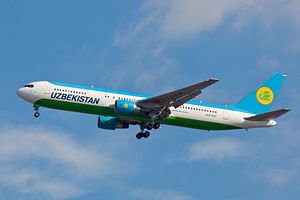On January 16, Uzbekistan Airways announced it would be opening a new route to Dushanbe, the capital of Tajikistan, in the coming spring. That may seem like a run-of-the-mill commercial announcement, but it disguises a slow-but-steady political convergence between the two countries. In the days leading up to the announcement, diplomats in Tashkent and Dushanbe also discussed the possibility of easing their reciprocal visa regime. The talks come after Komir Mirzoaliyev, head of Tajik Railways, recently pointed out that warmer relations between the two countries benefited passenger and cargo routes last year.
The security in the southern post-Soviet borders is often jeopardized both by bilateral skirmishes, as in the case of Tajikistan, Uzbekistan, and Kyrgyzstan, and by terrorism. Last week, in southern Tajikistan, eleven were killed during border clashes with militants from Afghanistan. In a separate incident, a border guard died in a shooting at the Kyrgyzstan-Tajikistan border. Finally, the second week of January saw another clash at the Kyrgyz-Uzbek border, with illegal hunters detained after crossing the border. Border relations among these three Central Asian countries have been strained for decades. Soviet borders did not respect historical and ethnic lines, sweeping potential ethnic tensions under the communist rug. Since 1991, authoritarian leaders have violently repressed violent ethnic outbursts.
Is the rapprochement only a façade? With the creation of the Eurasian Economic Union earlier this year, Uzbekistan is feeling increasingly isolated. Notwithstanding President Islam Karimov’s insistence that “Uzbekistan will never join the EEU,” the integration of its neighbors could put economic pressure on Tashkent during a time of crisis. Late in December, Uzbekistan surprised observers by resuming gas supplies to southern Kyrgyzstan. The blockade, in place since April 2014, had lasted too long for energy-thirsty Kyrgyzstan, a country struggling to supply its central heating needs. Some argue that the broker of the deal was Russian president Vladimir Putin, who met with Karimov just weeks prior to the resumption of supplies. Gazprom, owner of the Kyrgyz national gas company, had been lobbying the Uzbek side for months before the deal was reached. Uzbekistan, not without pressure and generous compensation, is starting to reach out to its neighbors. A side effect of the foundation of the EEU seems to be increased dialogue with third parties. Uzbekistan would prefer to be prepared to interact with the new economic bloc as a needed partner.
Nobody expected that Tashkent’s attitude towards Kyrgyzstan would be replicated towards Tajikistan. The breakthrough between Karimov and his Tajik counterpart, Emomali Rahmon, came during the last meeting of the Shanghai Cooperation Organization in Dushanbe. The negotiations to resume air traffic started on the margins of that September meeting. One figure nicely sums up the situation: In 2007, the trade turnover between the two countries was $300 million, in 2014 it plummeted to around $2 million. Taking off almost from ground zero, relations have nowhere to go but up.
Still, the picture is far from rosy. While Tajikistan routinely accuses Uzbekistan of blocking road and railroad access, Tashkent is worrying about a giant project that could undermine its water security. Rahmon wants to build a dam and a hydropower plant near Rogun on the Vakhsh River. The river is very important for Uzbekistan’s supply of water to sustain its cotton fields, a monoculture that remains an unfortunate legacy of the Soviet era. Tajikistan would use the dam to increase its electricity production, in the hopes of becoming a regional exporter and reducing its reliance on worker remittances from abroad. In addition, the World Bank-sponsored Rogun project would result in the construction of the tallest dam, a symbolic action, after Tajikistan raised the tallest flagpole in 2013.
This symbolic move, however, will cost between $2 billion and $6 billion. Their president’s national pride comes at a high cost for the citizens of Tajikistan, who were forced to buy shares in the project. The geopolitical costs might also be high, and could force Rahmon to reconsider the dam. After all, Uzbekistan will needs good deeds from the other side if that relative bonhomie is to continue.

































